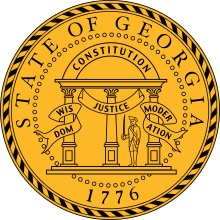Georgia state elections, 2006
| Elections in Georgia | |||||||||||
|---|---|---|---|---|---|---|---|---|---|---|---|
 | |||||||||||
| |||||||||||
| |||||||||||
| |||||||||||
| |||||||||||
Federal elections
United States Congressional elections
In 2006, all thirteen of Georgia's U.S. House seats were up for election. Neither of the Peach state's U.S. Senate seats were up for election that year.
United States House of Representatives elections
All thirteen of Georgia's incumbent Representatives sought re-election in 2006. Going into the elections, Republicans held seven of Georgia's U.S. House seats and Democrats held six seats. Notable House races in Georgia included those in the Fourth (more specifically the Democratic Primary), Eighth, and Twelfth districts.
Despite significant gains by Republicans in Georgia since 2002, such as consecutive Republican victories since in Presidential elections since 1996, gaining both of Georgia's U.S. Senate seats, the election of Sonny Perdue as Georgia's first post-Reconstruction Republican governor in 2002, successful elections of Republicans to other state executive offices, and gaining control of both chambers of the Georgia General Assembly for the first time since Reconstruction, Democrats have succeeded in gaining seats of Georgia's House delegation in recent House elections.
Following gains in both houses of the General Assembly in 2002 and 2004, Republicans enacted a mid-decade redistricting to alter the congressional districts created by the 146th Georgia General Assembly, which Democrats held control of at the time, with the intention of benefiting Republicans. Two Democratic incumbents who were especially targeted were Jim Marshall (GA-8) and John Barrow (GA-12). They were opposed respectively by former Representatives Mac Collins (who previously represented what is now the Third district) and Max Burns. These two races were among the most competitive in the nation, but ultimately resulted in both incumbents being re-elected by razor thin margins of 1 and 0.6 percentage points respectively.
The partisan makeup of Georgia's House delegation did not change, however one Incumbent, Cynthia McKinney (GA-4), was denied renomination by her 59% to 41% defeat in the Democratic Primary runoff to then-Dekalb county Commissioner Hank Johnson.
State elections
State Executive Officer elections
Gubernatorial election
Incumbent Governor Sonny Perdue, the first Republican Governor of Georgia since reconstruction, was re-elected over then-Lieutenant Governor Mark Taylor (D).
Other Statewide Officer elections
Prior to the elections, though Republicans held the Governor's mansion and majorities in both houses of the Georgia General Assembly, Democrats then-held five of the eight statewide offices. Following the elections, Republicans would pick up two positions, those being Lieutenant Governor and Secretary of State, with the victories of Casey Cagle (who became the eleventh overall and first ever Republican elected Lieutenant Governor) and Karen Handel (who became the twenty-sixth overall and first Republican since reconstruction to be Secretary of State) in each of their respective races. Both positions were open after the incumbent office holders chose to seek the governorship of Georgia.
All other state Executive Officers, Attorney General of Georgia Thurbert Baker (D), state Superintendent of Schools Kathy Cox (R), Commissioner of Insurance John Oxendine (R), Commissioner of Agriculture Tommy Irvin (D), and Commissioner of Labor Mike Thurmond (D), were re-elected.
Judicial elections
In 2006, four seats on the Supreme Court of Georgia and four on the Georgia Court of Appeals were up for election. All judicial elections in Georgia are officially non-partisan.
Supreme Court of Georgia elections
Incumbent state Supreme Court Associate Justices George H. Carley, Harold Melton, Hugh P. Thompson, and Carol W. Hunstein were all re-elected with three being unopposed. Only Hunstein received any opposition, which she overcame handily.[1]
Supreme Court (Hunstein seat) election
| Supreme Court of Georgia election, 2006[1] | |||||
|---|---|---|---|---|---|
| Party | Candidate | Votes | % | ±% | |
| Nonpartisan | Carol W. Hunstein | 1,170,973 | 63.1% | ||
| Nonpartisan | Mike Wiggins | 683,483 | 36.9% | ||
| Turnout | 1,854,456 | 100 | |||
Georgia Court of Appeals elections
Incumbent Judges John Ellington, M. Yvette Miller, Herbert E. Phipps, and J.D. Smith were re-elected without opposition[2]
References
| ||||||